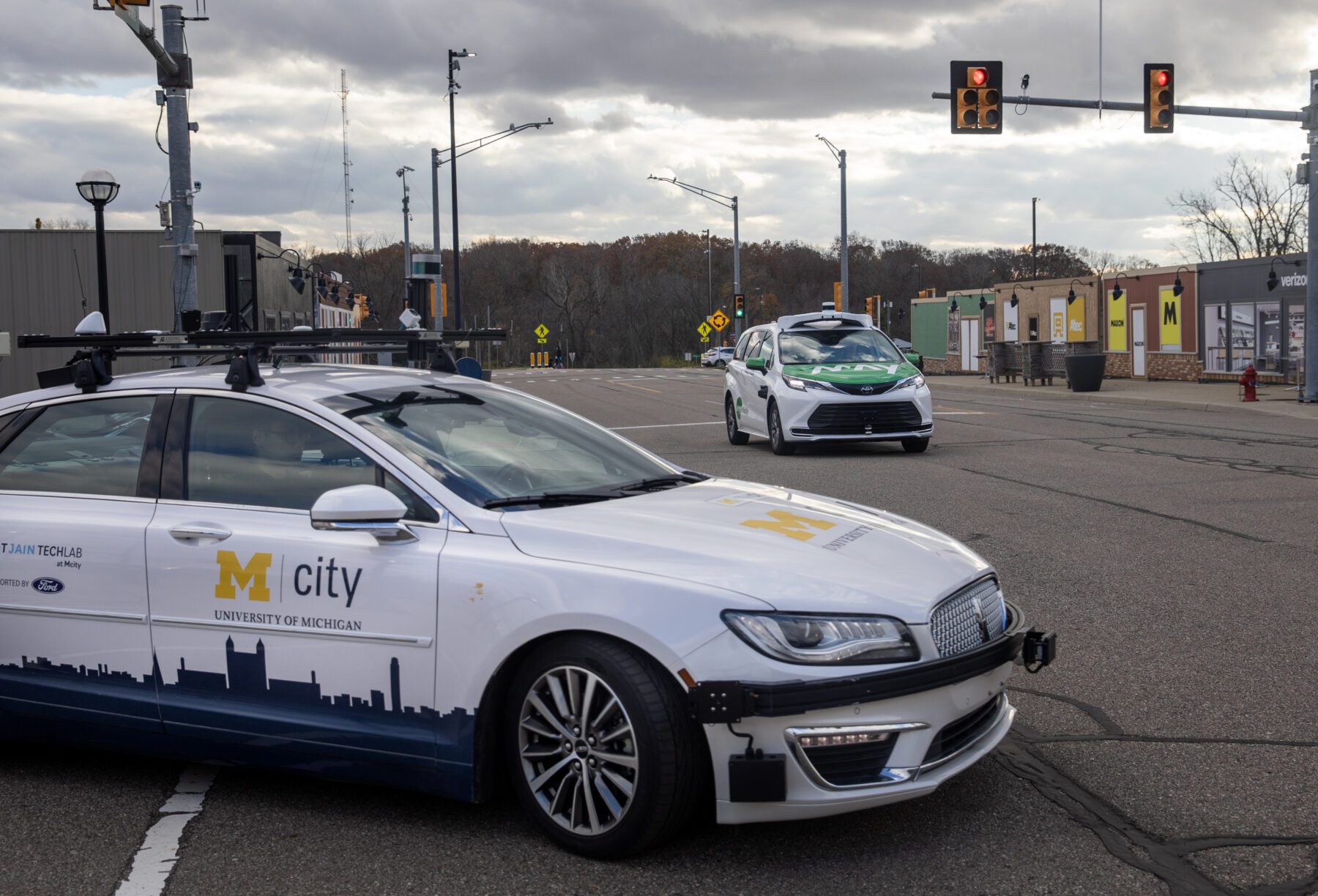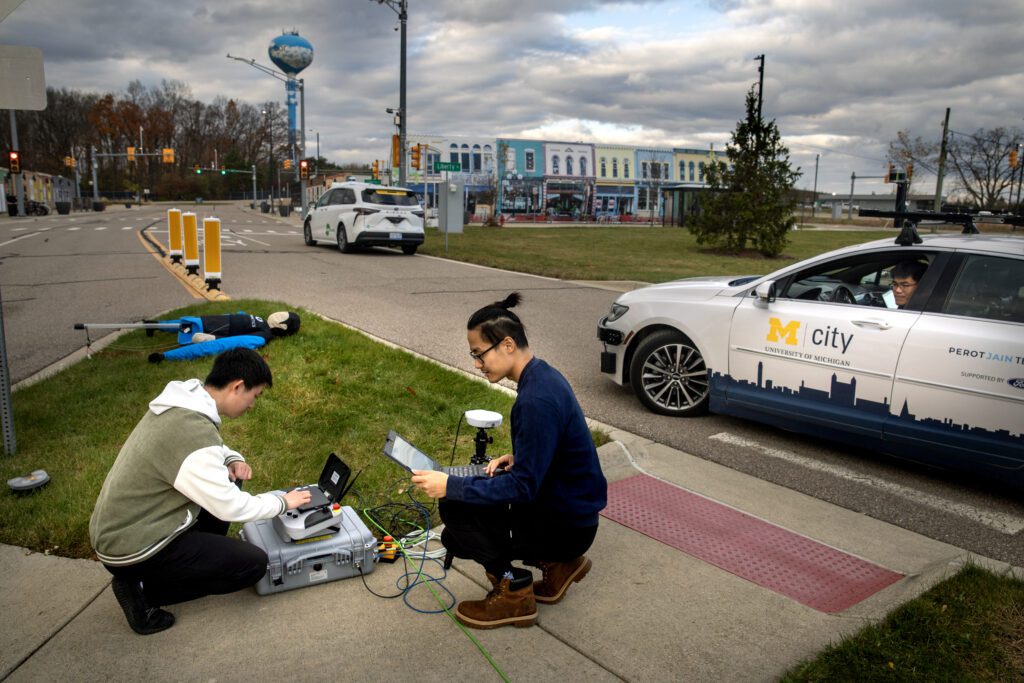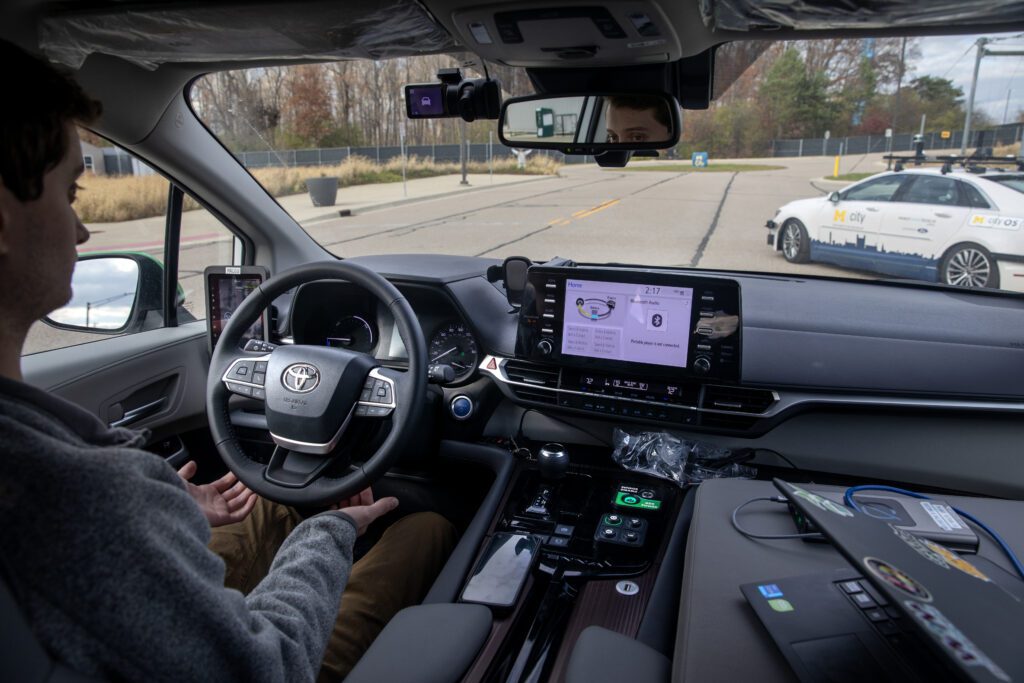Automated shuttle for Detroit starts safety testing at Mcity

The University of Michigan, May Mobility and the City of Detroit look to boost public trust in self-driving vehicle technology
ANN ARBOR—Testing of a new automated shuttle is underway at the University of Michigan’s Mcity Test Facility to ensure the technology is ready to safely serve older adults and people with disabilities in the city of Detroit.
Earlier this month, U-M researchers kicked off several months of testing with an automated vehicle provided by May Mobility, a leader in the development and deployment of AV technology.
The vehicle under test is identical to those destined for Detroit. The evaluation is taking place at the Mcity Test Facility—the world’s first purpose-built environment for testing connected and automated vehicles and technologies under controlled, realistic conditions. The shuttle will undergo a two-part test developed by Mcity, called the Mcity Safety Assessment Program.
The protocol includes:
- A “Driver’s License Test” that serves a purpose similar to a human driver’s test, measuring basic competency in ordinary scenarios.
- A “Driving Intelligence Test” that challenges AV software with a diverse set of dangerous driving scenarios—representing those that most often result in crashes, injuries and fatalities.
The augmented reality program combines physical vehicles, infrastructure and obstacles with computer-simulated people, vehicles and other objects.
“Automated vehicles have the potential to make transportation safer and cleaner while ensuring equitable access to mobility options. But only if consumers can trust the vehicles are safe. We believe the Mcity Safety Assessment Program could serve as the blueprint for a publicly visible safety framework, helping to bring automated vehicle technology to market in a manner that truly benefits society.”
Mcity Director Henry Liu
“Automated vehicles have the potential to make transportation safer and cleaner while ensuring equitable access to mobility options—but only if consumers can trust the vehicles are safe,” said Mcity Director Henry Liu, who is also the Bruce D. Greenshields Collegiate Professor of Engineering and director of the Center for Connected and Automated Transportation.
“We believe the Mcity Safety Assessment Program could serve as the blueprint for a publicly visible safety framework, helping to bring automated vehicle technology to market in a manner that truly benefits society.”
Testing of the shuttle for Detroit comes as recent traffic crashes related to driverless vehicles have raised broad concerns about safety.
To prioritize safety, the city of Detroit’s Automated Driving Systems shuttle pilot will undergo a thorough evaluation process, beginning with the testing at Mcity, and the deployment of the shuttles will feature a skilled safety operator on board in each May Mobility vehicle. These operators will be available to answer questions and assist wheelchair users when boarding and exiting the shuttle.

“From design to launch and beyond, we have embedded strong safety practices into all of our processes,” said Satvir Singh, director of product safety at May Mobility.
“Participating in Mcity’s Safety Assessment Program is one crucial step to ensuring that each AV we deploy will bring our riders to their destinations safely and comfortably. With the help of our partners at Mcity, we feel confident that our vehicles will exceed expectations and set a new standard for AV technology safety in Detroit and across the world.”

Testing of the shuttle at Mcity will likely run through February. From there, it will be sent to the American Center for Mobility in Ypsilanti, for extended high-speed testing.
Designed with equity in mind, the pilot aims to provide Detroit residents aged 65 and older or those living with disabilities with free transportation. It is intended to facilitate seamless travel to and from essential destinations such as stores, medical appointments, workplaces and more.
The Detroit City Council unanimously voted to approve a $2.4 million contract between the Office of Mobility Innovation and May Mobility in July, and the city plans to deploy the shuttle in June 2024.
“We are excited that the rigorous self-driving shuttle testing is underway with Mcity,” said Tony Geara, deputy chief of the city of Detroit’s Office of Mobility Innovation. “This thorough evaluation process underscores the city of Detroit’s commitment that self-driving technology will be safe and effective before it is on our streets.
“We are starting this ambitious pilot project with the Mcity Safety Assessment Program as a critical step toward learning how self-driving vehicles can effectively serve real community needs in Detroit.”
Liu is also a professor of civil and environmental engineering and engineering systems.
Detroit ADS: Self-Driving Shuttles
This story was written by Jim Lynch, a writer for Michigan Engineering.